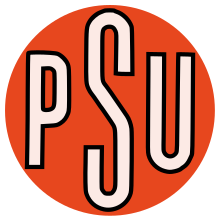Parti socialiste unifié
The Parti socialiste unifié ( PSU ; United Socialist Party) was a French party that was founded on April 3, 1960 and dissolved itself in 1989 . The PSU was a left-wing socialist party and represented ideas of democratic socialism . She saw herself as a representative of an undogmatic left (deuxième gauche) who turned against totalitarianism and colonialism, and positioned herself between the more or less social-democratic Parti socialiste and the Communist Party of France . In the 1970s and early 80s she represented (together with the CFDT union ) a “socialism of self-government” ( socialisme autogestionnaire ).
history
The PSU emerged from a merger:
- the Parti socialiste autonome (PSA), a spin-off from the Section française de l'Internationale ouvrière (SFIO) due to the Algerian question and the Constitution of the Fifth Republic, led by Édouard Depreux
- the Union de la gauche socialiste (UGS), founded in 1957 by dissenters from the SFIO, the PCF-affiliated Union progressiste , left Catholics (Jeune République) and Christian trade unionists as well as Trotskyists, led by Gilles Martinet ,
- a splinter group of the Parti communiste français that had rallied around the journal Tribune du Communisme , led by Jean Poperen .
Important events that led to the emergence of the PSU were, on the one hand, the Soviet suppression of the Hungarian uprising in 1956 (which the leadership of the PCF approved); on the other hand the Algerian War, in which an SFIO-led government violently opposed the independence movement, and the proclamation of the V Republic by General de Gaulle (which the SFIO also supported). That is why many representatives of the French left who opposed authoritarian politics, totalitarianism and colonialism were looking for an alternative to both the SFIO and the PCF. The most prominent founding member was the former Prime Minister Pierre Mendès France , who left his Parti radical after de Gaulle came to power in 1958 . Mendès France refused to take on a leadership position in the PSU. The party was therefore led from its founding until 1967 by Édouard Depreux and then until 1973 by Michel Rocard .
Similar parties emerged around 1960 in the Netherlands ( Pacifist Socialist Partij ), Denmark ( Socialistisk Folkeparti ) and Norway ( Sosialistisk Folkeparti ). They positioned themselves between pro-Western Social Democrats on the one hand and Communists loyal to Moscow on the other, and viewed the PSU as a sister party. The PSU played an important role in the political debates of the French left, especially in the 1960s. It was related to the Confédération française démocratique du travail (CFDT) union , which emerged in 1964 from the “deconfessionalization” of the previously Christian union Confédération française des travailleurs chrétiens (CFTC).
The PSU first ran for parliamentary elections in 1962, receiving 2.3% of the vote and two seats in the National Assembly. In the 1965 presidential election , the PSU supported François Mitterrand's presidential candidacy together with all other parties on the left . The 1967 election allowed the party to increase its parliamentary seats to four. The PSU peaked in popularity in the June 1968 general election (shortly after the student riots in May ), when the party received over 870,000 votes (3.9%). However, in this election she lost all constituencies and thus - due to the majority vote - her seats in parliament.
For the presidential elections in 1969 , the PSU ran for the first time with its own candidate, its chairman Michel Rocard, and, with demands for collective self-government , achieved 3.61% of the votes in the first round, the highest result that the PSU has ever achieved in presidential elections could be. An example in which workers' self-management ( autogestion ) became a reality was the Lip watch factory , in which employees took over the management from 1973–74. In the 1974 presidential election , the PSU supported François Mitterrand's renewed candidacy. When, in October 1974, Michel Rocard applied for the PSU to be affiliated with the Parti socialiste (PS), this led to fierce controversy. After losing the vote, Michel Rocard and numerous members with him left the PSU and joined the PS.
From 1979 to 1983 Huguette Bouchardeau led the party. She also ran as a presidential candidate in 1981 and received 1.1% of the vote in the first ballot. 1988 was Pierre Juquin , which had previously been expelled from the Communist Party and its presidential candidacy was also supported by the PSU, combine 2.1% of the votes. After the self-dissolution of the PSU in 1989, some of the remaining members went to the small party Alternative rouge et verte , which was merged into Les Alternatifs in 1998 ; another part switched to Les Verts .
Members
Despite its poor electoral success, the PSU had a number of prominent members, e. B. the historians François Furet , Emmanuel Le Roy Ladurie and Pierre Vidal-Naquet , the philosopher and writer Alain Badiou (member of the PSU in the late 1960s) and the writer Jean-Claude Izzo (member of the PSU 1966-68). There are also well-known politicians who were members of the PSU at a young age and who later made careers after switching to other parties. These include Jack Lang (member of the PSU at the end of the 1960s; later for the PSU Minister of Culture and Education), Arlette Laguiller (member of the PSU 1960-65; later spokeswoman and presidential candidate for Lutte ouvrière ), Marylise Lebranchu (member of the PSU 1972-77 ; later for the PS Minister of Justice) and François Lamy (member of the PSU 1978–85; later Minister and MP for the PS).
Election results in parliamentary elections
- 1962: 2.3%, 2 seats
- 1967: 2.3%, 4 seats
- 1968: 3.9%, no seat
- 1973: 3.3%, 1 seat
Web links
- Stéphane Lanchon: L'expérience historique: Le Parti Socialiste Unifié (1960-1989)



